Studio Tour: Broome Jenkins
Design Insider is delighted to share the latest edition of our Studio Tour series, this time with Broome Jenkins, where we spoke with Director, Barry Jenkins. In this Q&A, discover the journey of Broome Jenkins, their most exciting projects worked on and what the future holds for the design studio. We are also thrilled to announce Barry as a Design Insider Ambassador! You can find out more about our Ambassadors by clicking here.
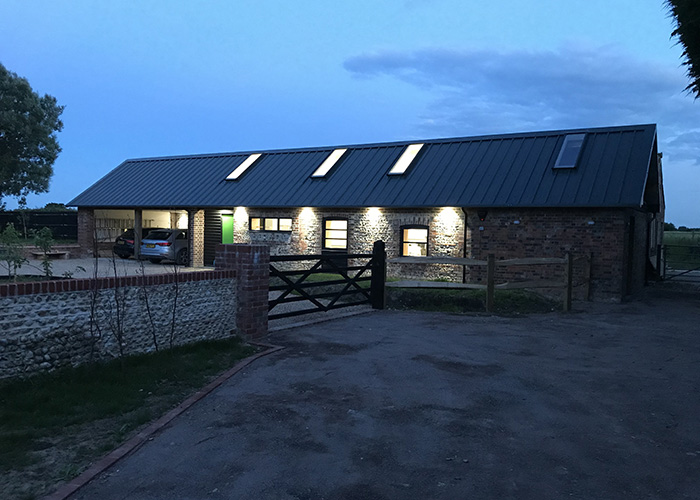
Broome Jenkins Studio
Please tell us about your studio’s history
When we started Broome Jenkins in 2003, we developed two distinct capabilities. One area I knew well was the workplace sector, and the other was designing for the urban/public realm.
Since then we have worked with many leading office furniture manufacturers including a long-term relationship with Herman Miller. Although our public realm clients were mainly local authorities including our own, we also completed several projects for Liverpool Culture Company and Liverpool John Lennon Airport .
However, the two areas overlapped because seeing how place-making was central to our public realm projects, it was clear to us that workplaces would benefit from expressing a sense of place as well. Today, we know ‘work’ is not always defined by location, and so physical workspaces are no longer shaped by purely operational constraints as they once were.
Like other designers, we entered the workplace sector by designing furniture systems. However, working with clients like Herman Miller and being part of a well-informed, exploratory culture meant that our approach changed. Workplace is now our main area of work, which today means more than designing office furniture.
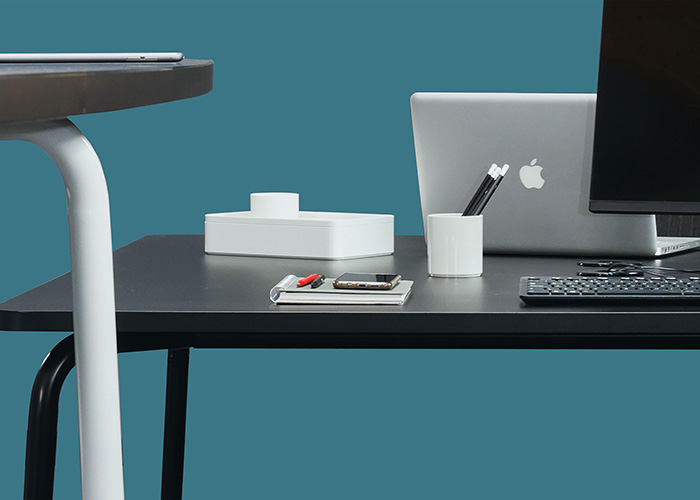
Venue Tables
Please could you tell us about where you and your team work?
From the beginning we have been based in Chichester. Although a lifestyle choice at the time, clients are everywhere. So there is no real need to be in a major urban centre, apart from finding good people to work with. Fortunately, it worked out well as in 2004 I found Julian Evans. My long-time collaborator, Julian, was already living in Brighton.
Having had a studio in the centre of Chichester for 16 years, in February 2020 we moved into a newly restored agricultural building next to my home. Spending a year rebuilding it and repairing 30 year-old fire damage, the timing was perfect although when we started the project, nobody knew about COVID. We now have a really great space, with a decent size workshop and a light and airy studio with plenty of room for assembling prototypes, hosting clients and showing new products.
However, the pandemic changed how we work and how we use the space, as remote working was not initially part of the plan. Travelling less and using Zoom more, has freed up time and saves energy and cost. There are efficiencies as a result and so being in the middle of farmland works for us.
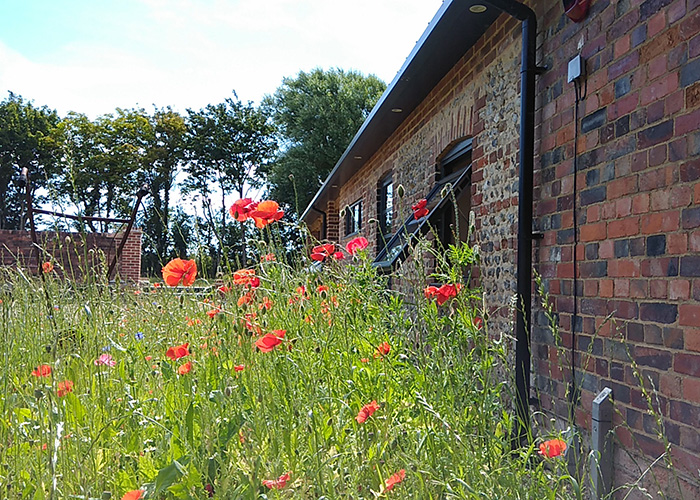
Please could you introduce us to the members of your team?
As a small business we have always encouraged collaborating, especially with specialists to complement our own skills, depending on the project. Given the competitive nature of the design industry, it makes sense to nurture a reliable network of associates to broaden skills and knowledge. That said, our core team is Julian Evans and Alys Bryan. Julian is very experienced in all aspects of product design. Alys has worked with us for more than five years, adding her broad skills as both a furniture designer and marketer.
As a recent example of our associates, designing Shuttle with Hotbox led us into the luggage and apparel sector. Although I had some industry experience from my early career, we brought in a long established colleague who had worked with companies across the luggage sector including Samsonite and Louis Vuitton. We were able to apply our workplace knowledge to develop a new product, addressing user scenarios in the context of remote and nomadic working. Our associate added invaluable technical knowhow we did not have, essential in the development process and eventual supply of the finished product comprising folio, tech pack and backpack.

Broome Jenkins Team
Please tell us about a selection of your key projects?
Hotbox Shuttle is a very interesting project for us. It is user centred and came from a strategic understanding of how IT and new ways of working had reduced the need for traditional office storage, replaced by personal/portable storage. Jamie Rothwell at Hotbox shared that understanding. A pioneer in this area, Hotbox is built around the needs of the agile, nomadic worker. They have been prolific, developing three new products in a little over two years.
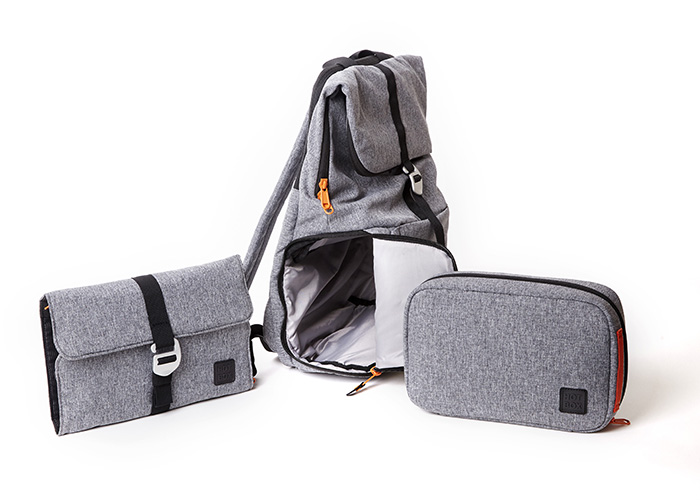
Hotbox Shuttle
We have been involved in two of the projects, both being done through lock-down, relying on zoom to pull together a dispersed team. Both projects were completed successfully and efficiently due to Hotbox’s focus, insight and commitment to the projects.
Another project I would choose is Fourfold, designed for Ocee International. Fourfold was a real 3D conundrum. A unique four-legged flip up table, it avoids the conventional ‘T’ leg frame used by other flip-up tables. The brief was challenging yet the innovative result is easy and safe to use, remains stable when folded and compact when stowed. Due to the precise design of the leg frame, Fourfold is the definitive solution. Any minor design variation will add complexity and compromise stability and compactness.
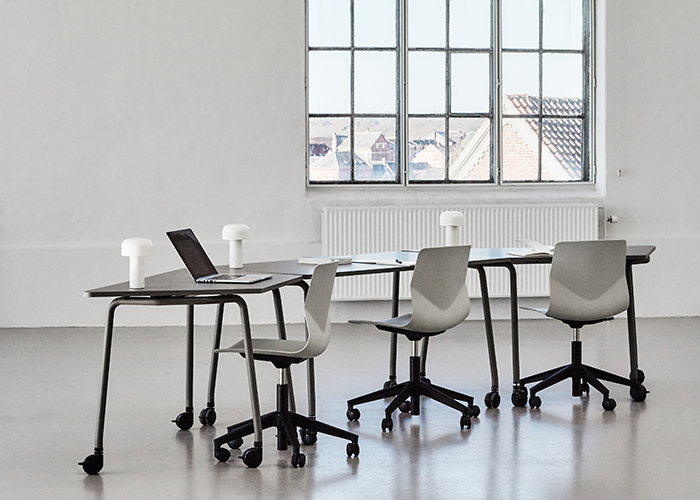
Fourfold, Ocee Design
What does the future hold for your studio?
We all face significant economic and industrial challenges. However, it is important to adapt to survive and to enjoy what we do. Therefore, we have changed our outlook and approach. Today, sustainability is absolutely essential. All industrial processes including recycling, result in an environmental consequence. Design is part of the problem and should therefore be part of the solution. A Norwegian client of ours promotes the aim to ‘buy well, buy once’. To some this may seem at odds with being in business. As designers however, we need to think about longevity and avoid a design approach only concerned with aesthetic differentiation. Like the fashion industry dealing with ‘fast-fashion’, the wider furniture industry needs to find a way to make lasting quality affordable.
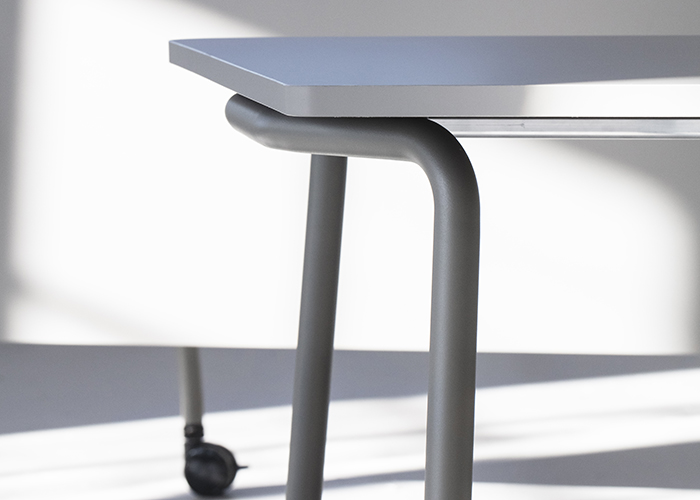
Thinking about this, we decided to develop our own furniture range. It explores the ideas of simplicity, efficiency and longevity. The result is Venue Tables. In this project we have taken responsibility for all aspects from concept through development to marketing. We have distilled over 40 years of industry experience into a project we are launching at Clerkenwell Design Week. Importantly, Venue Tables has allowed us to go beyond the established remit of a product designer. We have walked in the shoes of our clients, thinking differently about inventory, supply and logistics. Funding this project ourselves has also sharpened our attention to cost and design efficiency. Although the launch of Venue may mean our future will include being a manufacturer, we know this process will benefit future design projects we look forward to doing with our clients.




